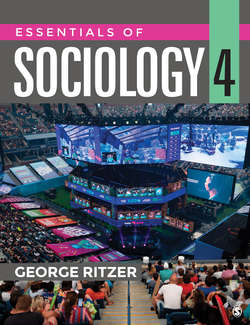Читать книгу Essentials of Sociology - George Ritzer - Страница 9
На сайте Литреса книга снята с продажи.
Letter from the Author
ОглавлениеThe social world, as well as the field of sociology that studies that world, is always interesting, exciting, and ever-changing. My goal for this newly revised fourth edition of Essentials of Sociology is not only to introduce you to sociology, but also to discuss what has inspired—and what continues to inspire—my dedication to the field. The hope is that you will learn a good deal about the social world from the perspective of sociology, as well as how my interests have shaped my personal sociological journey.
My initial interests in the field were the sociology of work and the sociology of organizations, but I was quickly drawn to sociological theory and how even the most classical theories were relevant to my everyday life. That interest came to fruition in the publication of The McDonaldization of Society in 1993 (now in its ninth edition). In that book, I apply and expand on Max Weber’s famous classical theoretical ideas on rationality. I saw those ideas at work in my local fast-food restaurant, as well as in many other contemporary settings. After the publication of The McDonaldization of Society, I grew interested in consumption, including credit card debt and the places of consumption, and I authored two books on these topics, Expressing America: A Critique of the Global Credit Card Society and Enchanting a Disenchanted World: Continuity and Change in the Cathedrals of Consumption. I developed a curiosity about globalization after recognizing that McDonaldization and consumer culture had spread rapidly throughout much of the world. This inspired me to write The Globalization of Nothing and Globalization: A Basic Text. Most recently, my sociological journey has led me to the internet, especially social networking sites, which are highly rationalized, are often places to consume, and are all globalized.
You will discover how my interests have shaped this book in a variety of ways. Consumption figures prominently in most chapters; this reflects my belief that this topic should be a central concern for sociologists. This book also includes a strong emphasis on globalization to encourage you to better understand and appreciate how your daily lives are shaped by global processes. Each chapter contains a primary section on globalization that explains why and how globalization has influenced an array of sociological issues, including the discipline itself. Throughout this book—in sections headed “Digital Living”—the sociological implications of the internet and technology are explored. To demonstrate the relevance of sociology not just within academia but to the broader public, an additional pedagogical feature, “Trending” boxes, has been included. These highlight recently published books written by sociologists and scholars in related fields that have gained mainstream popularity. Most of these books are based on extensive ethnographic research about current sociological problems, and their narratives are readable, relatable, and fascinating to me—I hope the same will be true for you. The Trending boxes also include links such as webpages where you can watch videos of authors discussing their books and/or read reviews of their books from popular newspapers and magazines.
Here I have described a bit about my personal sociological journey. I hope that this book will provide you with a starting point to begin your own journey, to examine your social world critically, and to develop your own sociological ideas and opinions. My aim in writing this book is to equip you to see the social world in a different way and, more important, to use the ideas discussed here to help to create a better world.
—George Ritzer, University of Maryland
